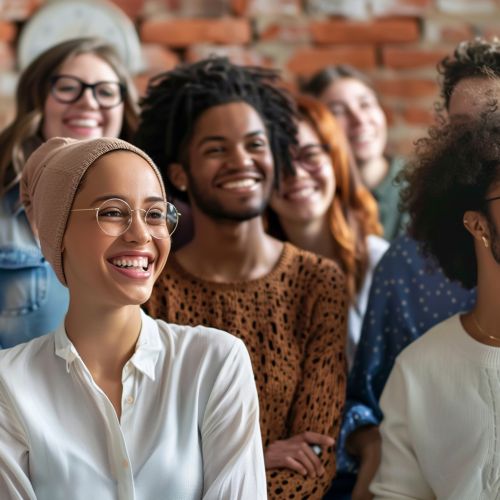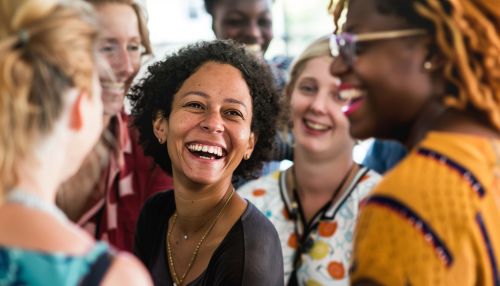Body Image and Self-Esteem: Difference between revisions
(Created page with "== Introduction == Body image and self-esteem are closely intertwined psychological constructs that significantly impact an individual's mental health and overall well-being. Body image refers to a person's perceptions, thoughts, and feelings about their physical appearance, while self-esteem pertains to the overall sense of self-worth or personal value. These concepts are influenced by a myriad of factors, including societal standards, cultural norms, personal experien...") |
No edit summary |
||
| Line 99: | Line 99: | ||
* [[Social Comparison Theory]] | * [[Social Comparison Theory]] | ||
[[Image:Detail-92103.jpg|thumb|center|A diverse group of people smiling and interacting in a supportive environment.|class=only_on_mobile]] | |||
[[Image:Detail-92104.jpg|thumb|center|A diverse group of people smiling and interacting in a supportive environment.|class=only_on_desktop]] | |||
== References == | == References == | ||
Latest revision as of 04:41, 18 June 2024
Introduction
Body image and self-esteem are closely intertwined psychological constructs that significantly impact an individual's mental health and overall well-being. Body image refers to a person's perceptions, thoughts, and feelings about their physical appearance, while self-esteem pertains to the overall sense of self-worth or personal value. These concepts are influenced by a myriad of factors, including societal standards, cultural norms, personal experiences, and psychological conditions. This article delves deeply into the intricate relationship between body image and self-esteem, exploring their definitions, determinants, consequences, and interventions.
Definitions and Concepts
Body Image
Body image is a multifaceted construct encompassing an individual's perceptions, thoughts, and feelings about their physical appearance. It includes:
- **Perceptual Body Image**: How one sees their body, which may not always align with reality.
- **Affective Body Image**: The feelings one has about their body, such as satisfaction or dissatisfaction.
- **Cognitive Body Image**: The thoughts and beliefs one holds about their body, including evaluations and comparisons.
- **Behavioral Body Image**: The actions one takes in response to their body image, such as dieting, exercising, or avoiding social situations.
Self-Esteem
Self-esteem is the evaluative aspect of the self-concept, reflecting an individual's overall sense of self-worth or personal value. It is influenced by:
- **Self-Concept**: The totality of an individual's thoughts and feelings about themselves.
- **Self-Efficacy**: The belief in one's ability to succeed in specific situations or accomplish tasks.
- **Social Comparisons**: Evaluations of oneself in relation to others.
- **Feedback from Others**: The impact of praise, criticism, and other forms of feedback on self-perception.
Determinants of Body Image and Self-Esteem
Societal and Cultural Influences
Societal standards and cultural norms play a significant role in shaping body image and self-esteem. Media representations often promote unrealistic ideals of beauty, leading to body dissatisfaction and low self-esteem. Cultural factors, such as ethnicity and cultural identity, also influence these constructs. For instance, Western cultures often emphasize thinness, while other cultures may value different body types.
Personal Experiences
Personal experiences, including childhood experiences, trauma, and interpersonal relationships, significantly impact body image and self-esteem. Negative experiences, such as bullying, teasing, or abuse, can lead to body dissatisfaction and low self-esteem. Conversely, positive reinforcement and supportive relationships can enhance these constructs.
Psychological Factors
Psychological factors, including personality traits, mental health conditions, and cognitive biases, influence body image and self-esteem. Traits such as perfectionism and neuroticism are associated with body dissatisfaction and low self-esteem. Mental health conditions, such as body dysmorphic disorder and eating disorders, are also linked to negative body image and low self-esteem.
Consequences of Negative Body Image and Low Self-Esteem
Mental Health Issues
Negative body image and low self-esteem are associated with various mental health issues, including:
- **Depression**: Persistent feelings of sadness and loss of interest.
- **Anxiety**: Excessive worry and fear.
- **Eating Disorders**: Conditions characterized by abnormal eating behaviors, such as anorexia nervosa and bulimia nervosa.
- **Body Dysmorphic Disorder**: A mental disorder characterized by obsessive focus on perceived flaws in appearance.
Physical Health Issues
Negative body image and low self-esteem can lead to physical health issues, such as:
- **Disordered Eating**: Unhealthy eating behaviors, including restrictive dieting, binge eating, and purging.
- **Substance Abuse**: The misuse of substances, such as drugs and alcohol, as a coping mechanism.
- **Self-Harm**: Deliberate self-injury as a way to cope with emotional pain.
Social and Interpersonal Issues
Negative body image and low self-esteem can impact social and interpersonal relationships, leading to:
- **Social Withdrawal**: Avoidance of social situations due to body dissatisfaction or low self-worth.
- **Interpersonal Conflicts**: Struggles in relationships due to low self-esteem and negative self-perception.
- **Impaired Social Functioning**: Difficulty in forming and maintaining healthy relationships.
Interventions and Treatments
Psychological Interventions
Psychological interventions aim to improve body image and self-esteem through various therapeutic approaches, including:
- **Cognitive-Behavioral Therapy (CBT)**: A therapeutic approach that addresses negative thought patterns and behaviors.
- **Mindfulness-Based Interventions**: Techniques that promote present-moment awareness and acceptance.
- **Self-Compassion Training**: Practices that encourage kindness and understanding towards oneself.
Medical Interventions
Medical interventions may be necessary for individuals with severe body image disturbances or low self-esteem, including:
- **Pharmacotherapy**: The use of medications to treat underlying mental health conditions, such as depression and anxiety.
- **Nutritional Counseling**: Guidance on healthy eating behaviors and nutritional support.
Social and Community Interventions
Social and community interventions aim to create supportive environments that promote positive body image and self-esteem, including:
- **Media Literacy Programs**: Education on the impact of media representations and the promotion of critical thinking skills.
- **Support Groups**: Peer support and shared experiences to foster a sense of community and belonging.
- **Advocacy and Policy Changes**: Efforts to promote body diversity and challenge societal standards of beauty.
Conclusion
Body image and self-esteem are complex and multifaceted constructs that significantly impact an individual's mental health and overall well-being. Understanding the determinants, consequences, and interventions related to these constructs is crucial for promoting positive body image and self-esteem. By addressing societal standards, personal experiences, and psychological factors, individuals can work towards a healthier and more positive self-perception.
See Also


